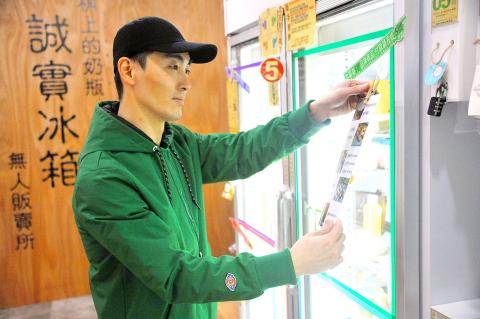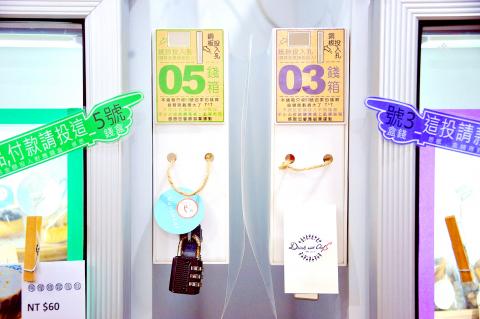King Chang (張欽) thought he had seen it all when someone drove up to his “honesty store” in a car, loaded up on goods, left a few coins and took off. But when a thief broke into one of the cash boxes, he was so overwhelmed that he closed the shop for a few weeks.
Opening in September last year in Taipei’s Xinyi District (信義區), Tree Top Milk Honesty Fridge (樹梢上的奶瓶之誠實冰箱) has no staff watching the store. Customers simply take items they want and deposit money into a corresponding cash box.
So far, Chang says the majority of customers have followed the rules — but the few “Pinocchios,” as he calls them, have caused him to remain in debt.

Photo: Han Cheung, Taipei Times
Despite his losses, Chang reopened the store last month and is intent on continuing his “honesty movement,” which he hopes will inject some positivity into society.
“People tell me that Taiwan is not ready for this kind of store yet,” he says. “I ask them, ‘At what point will we be ready?’ If we don’t start right now, we will never be ready.”
SELLING HONESTY

Photo: Han Cheung, Taipei Times
Chang says that aside from promoting honesty, he also wanted to provide small vendors with a physical space so they wouldn’t have to sell their merchandise in the street or online.
“It’s like having a street fair in the store,” he says.
The store contains two fridges, which are divided into eight sections for different vendors, who use the space for free but donate a portion of their profits to Chang. There are also two shelves that contain various handicrafts. All items are either locally handmade or for charity, and the vendors can also set up a pop-up shop to personally hawk their wares.
Chang rotates the vendors every two weeks to keep things fresh, but notes that it is hard to convince people to join because of the risk involved.
Tien Chung (田中), who sells homemade soy milk, says that he does most of his business online, and losing a few bottles at the honesty store will not affect his profits much.
“I came fully aware of the risks,” he says. “I like the concept of the store. Also, my products will get more exposure.”
Selina Lin (林莎莉), who sells French pastries and other delicacies, sees it as a “test of humanity.”
“Taipei is an advanced city, and people should have some public morality,” she says. “If we are afraid of [our products being stolen], we would not be here.”
DEALING WITH PINOCCHIOS
Cheng Tzu-leong (鄭自隆), advertising professor at National Chengchi University (政治大學) says that honesty stores can be seen as a measuring stick to a society’s progress. He points out that one could sell expensive merchandise in one city without problems, while in another, people will make off with the cheapest items.
For Taiwan, Cheng believes that honesty stores will only be profitable if the prices are no higher than NT$20.
“People here probably wouldn’t sacrifice their morals to steal something that cheap,” he says. “But try putting something that’s NT$200. I’m sure many won’t be able to resist.”
After several months of selling products that are way higher than NT$20, Chang has mixed feelings. On one hand, the number of honest people is much higher than he had expected. On the other hand, he found that even just a small number of Pinocchios can seriously affect business.
“They say good always triumphs over evil, but that does not seem to be the case here,” he says.
Chang says the Pinocchios are mostly regular people between 20 and 40 years old. Most have been reported to him by other customers.
He is still thinking of how to deal with the thieves. He’s confronted some of them, but doesn’t want to call the police just yet. He will start posting warning signs in the store, and perhaps add photos of repeat offenders.
“I opened this store to make society more harmonious,” he says. “There’s so much antagonism these days, and I don’t want to add to it. Instead, I hope that they do some soul searching after being warned and repent.”
Chang understands that there’s no way to completely eradicate the dishonest customers. But looking ahead, he also thinks the store is a good educational opportunity for the next generation.
“I’ve seen parents bring their kids in, tell them what honesty means and hoist them up so they can insert the coins into the box,” he says.
He’s also received a message from another store who decided to follow his model after reading a news report.
“I was very happy to hear that because if there are more stores like this in Taipei, our moral character will slowly but surely improve.”

On the evening of June 1, Control Yuan Secretary-General Lee Chun-yi (李俊俋) apologized and resigned in disgrace. His crime was instructing his driver to use a Control Yuan vehicle to transport his dog to a pet grooming salon. The Control Yuan is the government branch that investigates, audits and impeaches government officials for, among other things, misuse of government funds, so his misuse of a government vehicle was highly inappropriate. If this story were told to anyone living in the golden era of swaggering gangsters, flashy nouveau riche businessmen, and corrupt “black gold” politics of the 1980s and 1990s, they would have laughed.

This is a deeply unsettling period in Taiwan. Uncertainties are everywhere while everyone waits for a small army of other shoes to drop on nearly every front. During challenging times, interesting political changes can happen, yet all three major political parties are beset with scandals, strife and self-inflicted wounds. As the ruling party, the Democratic Progressive Party (DPP) is held accountable for not only the challenges to the party, but also the nation. Taiwan is geopolitically and economically under threat. Domestically, the administration is under siege by the opposition-controlled legislature and growing discontent with what opponents characterize as arrogant, autocratic

When Lisa, 20, laces into her ultra-high heels for her shift at a strip club in Ukraine’s Kharkiv, she knows that aside from dancing, she will have to comfort traumatized soldiers. Since Russia’s 2022 invasion, exhausted troops are the main clientele of the Flash Dancers club in the center of the northeastern city, just 20 kilometers from Russian forces. For some customers, it provides an “escape” from the war, said Valerya Zavatska — a 25-year-old law graduate who runs the club with her mother, an ex-dancer. But many are not there just for the show. They “want to talk about what hurts,” she

It was just before 6am on a sunny November morning and I could hardly contain my excitement as I arrived at the wharf where I would catch the boat to one of Penghu’s most difficult-to-access islands, a trip that had been on my list for nearly a decade. Little did I know, my dream would soon be crushed. Unsure about which boat was heading to Huayu (花嶼), I found someone who appeared to be a local and asked if this was the right place to wait. “Oh, the boat to Huayu’s been canceled today,” she told me. I couldn’t believe my ears. Surely,